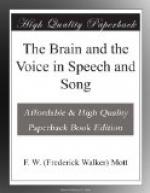more developed and the hemispheres less developed
than in man; in man, the hemispheres so surpass in
development those of animals that we can find no analogy.
Gall therefore argued that we must consider the cerebral
hemispheres to be the seat of the higher functions
of the mind. We must moreover acknowledge that
the following deductions of Gall are quite sound:
“The convolutions ought to be recognised as
the parts where the instincts, feelings, thoughts,
talents, the affective qualities in general, and the
moral and intellectual forces are exercised.”
The Paris Academy of Science appointed a commission
of inquiry, May, 1808, which declared the doctrine
of Gall to be erroneous. Gall moreover surmised
that the faculty of language lay in the frontal lobes,
and Bouillaud supported Gall’s proposition by
citing cases in which speech had been affected during
life, and in which after death the frontal lobes were
found to be damaged by disease. A great controversy
ensued in France; popular imagination was stirred
up especially in the republic by the doctrine of Gall,
which was an attempt to materialise and localise psychic
processes. Unfortunately Gall’s imagination,
encouraged by a widespread wave of popular sympathy,
overstepped his judgment and launched him into speculative
hypotheses unsupported by facts. His doctrine
of Phrenology was shown to be absolutely illogical;
consequently it was forgotten that he was the pioneer
of cerebral localisation.
SPEECH AND RIGHT-HANDEDNESS
The next step in Cerebral Localisation was made by
a French physician, Marc Dax, who first observed that
disease of the left half of the cerebrum producing
paralysis of the right half of the body (right hemiplegia)
was associated with loss of articulate speech.
This observation led to the establishment of a most
important fact in connection with speech, viz.
that right-handed people use their left cerebral hemisphere
as the executive portion of the brain in speech.
Subsequently it was shown that when left-handed people
were paralysed on the left side by disease of the right
hemisphere, they lost their powers of speech.
But the great majority of people are born right-handed,
consequently the right hand being especially the instrument
of the mind in the majority of people, the left hemisphere
is the leading hemisphere; and since probably specialisation
of function of the right hand (dexterity) has been
so closely associated with that other instrument of
the mind, the vocal instrument of articulate speech,
the two have now become inseparable; for are not graphic
signs and verbal signs intimately interwoven in the
development of language and human intelligence?




